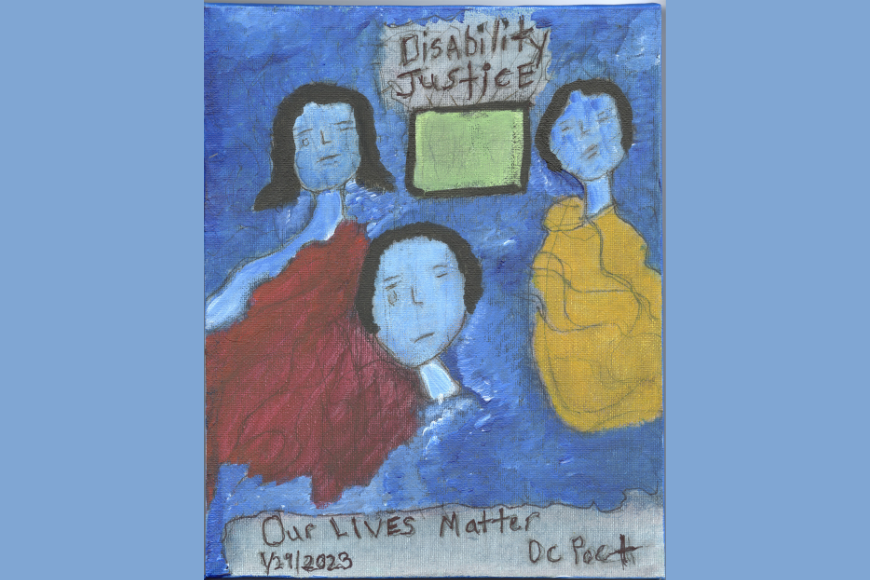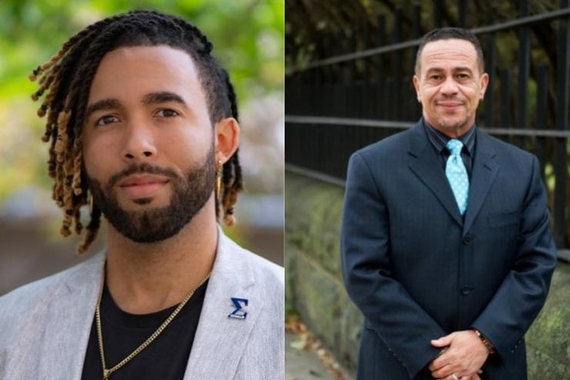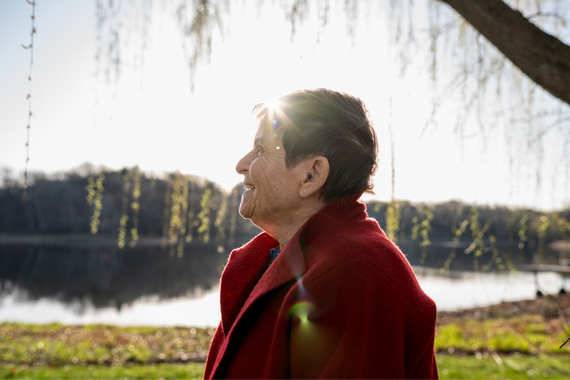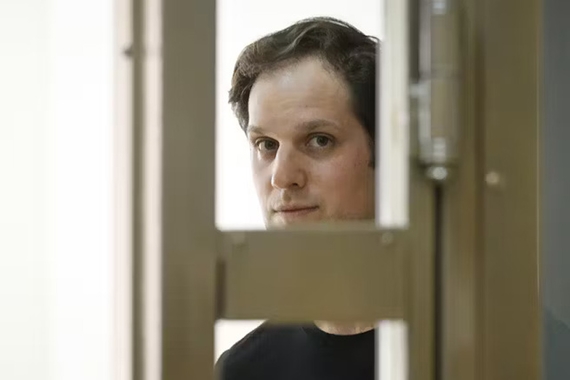Celebrating the joy and brilliance of the disabled community
Longing for a movement that would address the multidimensional oppression faced by disabled people, AmplifyMN—a disability justice collective—was born. Operating from an intersectional framework for social change, they are committed to leaving no one behind. Working in collaboration with the Liberal Arts Engagement Hub as part of their Hub residency, AmplifyMN is set to debut a groundbreaking exhibition at Mill City Museum that showcases the works of local disabled artists.
The Hub is a unique space dedicated to fostering public engagement and civil society, creating important reciprocal partnerships with the community to respond to important social problems. AmplifyMN’s exhibition seeks to serve as the catalyst for important conversations about disability justice by providing visibility to the experiences and perspectives of disabled artists.
Angela Carter and Mai Thor are two AmplifyMN members who are helping with this project. Through the exhibition, AmplifyMN and the Hub hope to help others see disability as identity, akin to other marginalized communities, complete with its own history, culture, and contributions.
Celebrating Lived Experiences
The exhibition, set to open July 19th at Mill City Museum, is deeply rooted in the personal experiences and diverse identities of the artists involved. “Most folks want a way to share their lived experience, and that’s one way of doing that,” Thor explains. “You don’t often get to see work from disabled folk,” she continues. “The feelings, and the struggles, and all the good things too. Those are things that I’m really hoping we capture through this project, because it matters.”
By presenting authentic narratives through the use of a wide variety of visual art such as collage, paintings, prints, textile, poetry, and sculpture, amongst others, AmplifyMN hopes to bridge gaps in understanding and highlight the richness of these unique experiences.
“Everybody’s lived experience is their own, but I hope that your takeaway would be: even though I may not identify as disabled or perhaps even if I am disabled, I’m so glad I can emerge with a better understanding of the lived experiences of other folks.”
Towards The Root of The Issue
AmplifyMN’s work underscores the critical and often-overlooked distinction between disability rights and disability justice. While the disability rights movement seeks legal recognition and equal opportunities for disabled individuals, it often fails to address the broader systemic issues at play. “The movement for rights is a call for the government to treat us as human beings and give us the same rights and opportunities,” explains Carter, who is a co-founding member of the Critical Disability Studies Collective. “However, disability justice says inclusion into what? Into a system that causes harm.”
“We’re here to talk about our intersectional, marginalized identities and how the current systems and institutions do not address our specific needs,” Thor continues.
This work brings with it its own unique challenges. One significant hurdle in organizing and executing the exhibition was navigating the bureaucratic processes that so often do not accommodate the diverse needs of disabled individuals.
“A big part [of this work] is the dreaming aspect,” Thor says. “I see a barrier seeing people dream up this work with us and really helping them understand what it’s all about.” In recent years, however, AmplifyMN noticed a trend following COVID-19 and the murder of George Floyd that Thor says really “lit a fire under folks to rethink how they want to do social justice in their work.”
“That includes disability,” she continues. “People are starting to recognize it as a legit thing that needs to be cultivated and grown. Treating people with disabilities like people. Disability as an identity.”
“What does it mean to take care of each other? How can healing justice be a part of this work?” Carter ponders.
To Be Human
AmplifyMN shares a profound desire for viewers to depart from the exhibition having gained a deeper understanding of what it means to be human. “Being able to feel vulnerable but still knowing you’re safe because you can be reflective upon it,” Thor explains, “through the expression of other people’s creativity and artwork, it’s sort of cathartic and therapeutic to have those feelings bubble up to the surface by seeing someone else’s creation."
“That’s what I hope people can take away," she continues. "I think disability overall is something people don’t like talking about because it reminds them that our bodies, our minds, are not perfect. But it’s okay because that’s part of being human. Disability is just an ugly matter for most folks and we try too hard to be perfect even though we never will be. If one person can feel that way after seeing the exhibition, then we would have been successful in this work.”
Carter echoes the sentiment, emphasizing that disability is an inherent aspect of the human condition. “The saying is we all become disabled if we live long enough. This is what it means to be human and there’s nothing wrong with imperfection,” she says. “There’s nothing wrong with my body or mind just because it works differently. These ideas of wrongness are what create this ableist society, and these ideologies get internalized.”
“There is joy and brilliance and community and greatness in disabled life and the disabled community even with all the hardships. I’m really hoping in particular that people who are able to be there opening night are able to see and connect with that crip joy. Because when we only focus on the struggle, we are denying our humanity too. We are complex human beings,” Carter states.
“We’re not going anywhere.”
See the Exhibit
AmplifyMN's exhibition at the Mill City Museum opens on Friday, July 19, 2024; you can attend in person or virtually! The opening night will feature performing artists including Houa Moua, Said Shaiye, Molly Joyce, and Alison Bergblom Johnson.
Visit the The Art of Disability Justice Now in the Twin Cities website to register!
The Liberal Arts Engagement Hub
AmplifyMN is one of eight Hub Residencies for the 2023-2024 academic year. The Liberal Arts Engagement Hub seeks to facilitate reciprocal and trusting partnerships between humanistic scholars in the arts, humanities, and social sciences and the community to respond to important social challenges.
This story was written by Regina Ramos-Francia Ylizaliturri, an undergraduate student in CLA.



